Global Issues
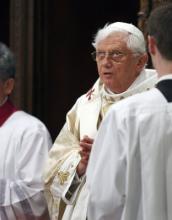
VATICAN CITY — Just months after becoming the first pope in nearly 600 years to resign, reports are surfacing that Pope Emeritus Benedict XVI is in poor health with diminished stature and energy.
After a brief hiatus at the papal summer residence in Castel Gandolfo, Benedict returned to live in a converted monastery on the edge of the Vatican gardens last month. Already, some of his visitors have commented on the former pope’s physical deterioration.
“Benedict is in a very bad way,” said Paloma Gomez Borrero, a veteran Vatican correspondent for Spain’s Telecinco television network who visited the former pope in late May. “We won’t have him with us much longer.”
Cardinal Joachim Meisner, the archbishop of Cologne, Germany, and a personal friend of Benedict’s, visited the former pope in April.
“I was shocked at how thin he had become,” Meisner said at the time. “Mentally, he is quite fit, his old self. But he had halved in size.”
THE 2011 REVOLUTION that led to the ouster of Egyptian President Hosni Mubarak signaled hope and liberation for the people of Egypt. But many Egyptians and others fear that President Mohamed Morsi, in his actions to consolidate power and quell opposition, has become “Mubarak with a beard.”
Sen. Ehab El Kharrat, a psychiatrist and Christian member of the Shura Council, Egypt’s upper house of Parliament, still looks to his country’s future with hope. Kharrat talked with Mary Theresa Webb early this year while the senator was in Washington, D.C., for the National Prayer Breakfast. Webb is the founder of the GOAL Project, a U.S.-based organization that provides addiction recovery training for churches and communities around the world, including Egypt.
—The Editors
Mary Theresa Webb: You are one of three Christians elected to the Egyptian Parliament. Could you describe why you decided to run for office? How does your Christian faith influence your work?
Ehab El Kharrat: I was elected by both Muslims and Christians to serve the whole people. I stand for love and freedom, and I think these are the things my savior and Lord Jesus stood for. My political involvement is not about the rights of the Christian minority in Egypt, but about the rights and dignity of all.
We on the Shura Council have received threats from violent groups, Muslim extremists, and the secularist terrorist group called the Black Bloc, who wear black masks and defend secular protesters with violence. I once stood up in a human rights session and said that I may be threatened and killed, but I will not accept the Black Bloc members’ violence and pledged all to refrain from such violence. If I die, I die. But I want to keep our revolution peaceful.
I like to think that the spirit of Christ is the spirit of justice, freedom, and love. One of my heroes, Charles Grandison Finney, the 19th-century New England theologian and revivalist, said [paraphrase], “Revolution is inevitable if the virtue or wisdom of the people exceeds that of its rulers, or if the vice and ignorance of the people exceeds that of its rulers.” I like to think that the first half of his statement applies to the Egyptian revolution.
LIKE MANY Palestinians forced from their homes during the 1948 war, relatives of Jordan’s Sen. Haifa Najjar carried the keys to their Palestinian homes with them as they fled. These keys, passed down through generations, are powerful symbols of Palestinian ties to the land that international law considers theirs—even as their hope for return wanes.
As a Christian appointed by King Abdullah II to Jordan’s upper house of Parliament, Najjar is active in the education, environment, cultural, and legal sectors of the government. She is also superintendent of the Anglican-run Ahliyyah School for Girls and Bishop’s School for Boys in Amman, Jordan.
Within the mix of the 500,000 Palestinians who relocated to Jordan because of the Israeli War of Independence—or Nakba, “the catastrophe,” depending on who you ask—was a vocal minority of Palestinian Christians who joined their ranks with the existing Jordanian Christian community. Prior to 1948, Christians accounted for nearly 20 percent of the population of what is now Israel/Palestine. Today that figure is less than 2 percent. Even more dramatic are declines in the West Bank cities of Ramallah and Bethlehem. Christian populations are nearly extinct in these locations compared to their respective majorities of 90 and 80 percent prior to 1948.*
“They moved not as immigrants; they were initially thinking it was a temporary thing,” says Father Nabil Haddad of the Melkite Catholic Church in Amman. “It is similar to what Syrians are thinking right now when crossing the barbed wire, not the checkpoints, between south Syria and north Jordan.”
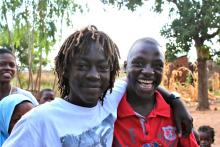
Look for a billboard on the right and a sign on your left. There’s a dirt road. Turn there.
In this part of the world, most of the streets have no names. So the directions we were given to find the new compound where my son’s Malawian relatives relocated a few months earlier were pretty specific given the circumstances.
We had hoped to be able to visit with Vasco’s 16-year-old half-brother, Juma, his Aunt Esme, and a handful of cousins and other relations for a couple of hours. By the time we found the family’s new compound, we had less than an hour before we had to get back on the road, meet the rest of our traveling companions, and head north before the sun fell.
I was heartbroken. But when we pulled up in our van, Vasco’s relatives were so happy to see us (and vice versa) that even the woefully short visit felt richly blessed. It had been three years since we’d seen each other. The last time was in May 2010 when Vasco, my husband, and I traveled from California to Blantyre for our adoption hearing. We spent a month in Blantyre and were able to get to know Vasco’s extended family (or, sadly, what remains of it) and begin piecing together our son’s complicated biography.
Since our last visit, Vasco, now 13, has grown about a foot and then some. He’s also traded his close-cropped “Obama cut” for Bob Marley-esque locks. Vasco wasn’t the only one who’d changed – visibly and otherwise.
Malawi is one of the poorest countries on the planet, with more than 9 million people living on about $1.25 a day. HIV/AIDS, which we believe claimed the lives of Vasco’s birth parents before he would have entered kindergarten, remains a critical health issue. Among 15- to 49-year-olds, the HIV/AIDS rate hovers above 10 percent despite widespread efforts to combat the fully preventable disease.
Malaria, tuberculosis, and diarrhea-related fatalities remain high in Malawi. So does unemployment, particularly among younger workers in urban areas such as Blantyre, where it is approximately 70 percent.
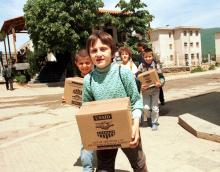
There might be big changes coming to the United States food aid program this year, and it could save millions of lives.
U.S. food aid, which began in the 1950s, spends an average of $2 billion a year* and has done much to prevent hunger and starvation across the globe. However, it has also been criticized for being inefficient, wasteful, and even self-serving.
Currently, up to 75 percent of the money we spend on food aid has to be used to pay for purchasing food from American farmers and shipping them overseas. This food saves lives, yes, but up to 16 percent of the money is spent on shipping. To make matters worse, American commodity crops are often significantly more expensive than food bought elsewhere.
Without such high requirements for American commodities, more money could go to buying food and saving lives. In fact, the United States is the only donor country to mandate by law that a certain amount of its donations must support its own economy.

Growing up Catholic in England, Candida Moss felt secure in life, yet was told in church that Christians have been persecuted since the dawn of Christianity. Now, as an adult and a theologian, she wants to set the record straight.
Too many modern Christians invoke, to lamentable effect, an ancient history of persecution that didn’t exist, Moss argues in her newly published book, The Myth of Persecution: How Early Christians Invented A Story of Martyrdom.
Although anti-Christian prejudice was fairly widespread in the church’s first 300 years, she writes, “the prosecution of Christians was rare, and the persecution of Christians was limited to no more than a handful of years.”
We asked Moss, professor of New Testament and early Christianity at the University of Notre Dame, to talk about the travails of early Christians, and how they are misappropriated in the public sphere today. The interview has been edited for length and clarity.
VATICAN CITY — Gains in Asia and Africa are making up for losses in Europe among the world’s 1.2 billion Catholics, according to Vatican statistics released Monday, signaling a shift of the church’s center of gravity toward the Global South that was heralded by the election of the first Latin American pope.
Data published in the 2013 Statistical Yearbook of the Church also show that while the number of priests in the Americas and in Europe is declining compared to the overall Catholic population, those losses were offset by increasing ranks of permanent deacons.
There are now about 41,000 permanent deacons worldwide, a 40 percent increase over the past decade. The vast majority of them — 97.4 percent — live in the Americas or in Europe.
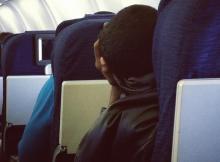
OUR PLANE SITS at the gate in Brussels well past our departure time. Slowly, the empty seats fill with Somali refugees whose flight a day earlier had been cancelled. After a night in the airport, they slide wearily into scattered seats.
Ten years together in a refugee camp in Uganda has melded the group into a close-knit family. What do they feel now, I wonder, knowing that on the other end of this flight they will scatter, not to empty seats but to unknown cities throughout the U.S.? From Syracuse to San Francisco, they will look upon a world they have never imagined. “When will I see my friend?” one little girl asks, not realizing she and her friend will live half a continent apart.
I watch a man a few rows ahead of me. I learn from his friend that he suffers from headaches. I know enough about refugees to realize headaches will likely be the least of his challenges. He and his family will face a confusing culture, strange language, unfamiliar religious practices, unknown yet required skills, and new technology—from flush toilets to garage door openers, from light switches to iPads. Then they’ll have to sort out schools and jobs and health care. They’ll be starting over, basically, with nothing.
Almost nothing. One suitcase per person contains the bit of their past they carry into their future. These slim and elegant humans are traveling very light. Unless, of course, you count the weighty baggage of war and displacement.
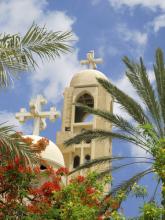
Pope Francis on Friday met with Pope Tawadros II, head of Egypt’s Coptic Orthodox Church, an encounter that brought the number of popes within the Vatican walls to three this week.
Benedict XVI, the emeritus pope, returned to the Vatican on May 2, two months after his resignation, while Tawadros is only the second Coptic pope to visit the Vatican, after the historic visit of Pope Shenouda III to Pope Paul VI in 1973.
Tawadros — on his first foreign trip since he was elected in November — is staying at the Vatican’s guesthouse where Pope Francis is also living. Benedict is now living in a revamped convent a 5-minute walk away, but there were no plans for the two men to meet.
JERUSALEM — Religious leaders from around the world have stepped up their pleas for the safe return of two Syrian bishops who were kidnapped April 22 by armed men as they were driving near the war-torn city of Aleppo.
The kidnappers, who have not been identified, abducted Greek Orthodox Metropolitan Boulos Yazigi and Syriac Orthodox Metropolitan Youhanna Ibrahim, both of Aleppo, while they were undertaking a “humanitarian mission” to help Syria’s Christian minority, according to Syrian Christian expatriates in the U.S.
The bishops’ Syrian Orthodox driver was killed in the attack.
Since 2011, more than 70,000 Syrians have died in fighting in the bloody civil war between forces loyal to Syrian President Bashar Assad and rebels seeking to oust Assad’s strong-arm regime.
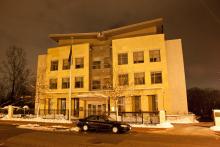
Several atheist protests planned for Thursday outside Bangladeshi embassies and consulates were postponed in the wake of Wednesday’s building collapse that killed at least 244 people in that country’s capital, Dhaka.
A coalition of secularist advocacy groups originally planned to rally in London and several cities in the U.S. and Canada over the arrests of four atheist bloggers who were charged with blasphemy in the officially Muslim nation.
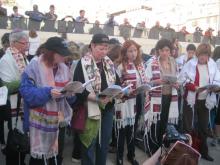
JERUSALEM — Women who want to wear prayer shawls while praying in the women’s section of the Western Wall are not breaking the law, according to a landmark decision handed down Thursday by the Jerusalem District Court.
Israeli police arrested five women on April 11 who were dressed in prayer shawls while praying with Women of the Wall, an activist group that prays at Judaism’s most sacred site once a month.
Immediately following those arrests, a lower court judge ruled that the women had not violated “local custom,” a legal concept intended to keep the fragile peace at holy sites. The Western Wall is a remnant of the Second Temple that was destroyed nearly 2,000 years ago.

Stories are what change the world, more than just ideas. And that’s what I am seeing and hearing on the road — stories that will change people for the common good. Nobody outside of Washington trusts Washington because there are no more human stories — just money and the calculations of power.
But even Washington can be affected by the stories outside of Washington — take immigration reform for example, which will happen despite the political paralysis. People of faith are telling their stories of conversion to what their Bibles say about “the stranger.” They are telling stories of new relationships with their “undocumented” brothers and sisters. And their stories are changing Washington.
So rather than just offer you more “ideas” about the common good, we are going to offer you some stories about how ordinary people are creating it.
Some talented young filmmakers have created stories to inspire you. This first video tells in beautiful scenes, the story of how a group in the Dominican Republic is using a recycling program to fund senior services. It’s about community and about serving our neighbors. It is a real inspiration for working within our own spheres of influence for the good of all.
Watch. Listen. And then create your own story for the common good.
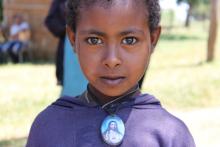
Many of today’s evangelical Christians seem to be taking to heart the words traditionally attributed to St. Francis of Assisi: “Preach the gospel at all times. When necessary, use words.”
Or at least they were at the recent Q Conference here, a gathering of more than a few of the most influential and innovative mover-shakers of the evangelical world.
Over the course of two days in a format similar to the popular TED talks, the speakers spoke passionately more about what they were doing to make the world a better place than they did about getting more butts into pews on any given Sunday.
An international consortium of nonbelievers is planning rallies Thursday outside Bangladeshi embassies and consulates to demand the release of several Bangladeshi bloggers who were arrested on charges of blasphemy.
The rallies are in support of four Bangladeshi men arrested earlier this month for “hurting religious sentiments,” a crime tied to an 1860 law that can carry up to 10 years in jail.
The four men — all bloggers — staged a sit-in at a public square demanding a ban on the country’s largest Islamic political party; Islam is the official state religion in Bangladesh.
The Islamic political party known as the Muslim Brotherhood has soured American attitudes towards Egypt, arguably America’s most important Arab ally, since its candidate Mohamed Morsi won presidential elections there in June 2012.
That’s according to a poll released Friday by the Arab American Institute in Washington, D.C.
Morsi’s term has been dogged by charges that he opts for authoritarian measures such as martial law. Muslim-Christian clashes have also shadowed his term; there were clashes on April 5 in the town of Khosus that killed four Coptic Christians and one Muslim, and violence also marred the April 7 funeral for the Copts who were killed in that conflict.
According to the Institute’s poll of 2,300 likely voters, only 36 percent of Americans had favorable views of Egypt, down from 66 percent in 1997. At least some of the decline has been attributed to the Muslim Brotherhood, which won Egypt’s parliamentary elections in January 2012, and to Morsi himself, who won the presidency last June by a 52-48 percent margin.
Freedom has always been important to Americans, but a short-sighted definition of freedom has played havoc with the common good recently. Communities, essential to our survival and well-being, are suffering.
All communities have rules. In my faith community, there are two great commandments: Love God and neighbor (even enemies). It’s a difficult balance, but when I manage it, I experience freedom from fear, a major reason that I joined the church in the first place. Those two basic rules have held up well, especially as my neighborhood has expanded to include the whole world.
IT'S BEEN SAID that one of the most radical things Jesus did was to eat with the wrong crowd. Undoubtedly, folks on the Left were frustrated with Jesus for making friends with Roman tax collectors. And folks on the Right were surely ticked at him for hanging out with Zealots. Dinner must have been awkward with both of them at the table; after all, Zealots killed tax collectors for fun on weekends.
But Jesus was a subversive friend, a scandalous bridge-builder, a holy trespasser. Just as we are known by the company we keep, so was Christ—accused of being a "glutton and a drunkard, a friend of tax collectors and sinners" (Luke 7:34). He was put on trial for being a rabble-rouser and a traitor. He got in trouble with the religious elite for crossing the line, overstepping purity laws and cultural norms, and disrupting the status quo. His love had no bounds and his friendships defied categories. He insisted on calling his followers friends: "I no longer call you servants, because a servant does not know his master's business. Instead, I have called you friends" (John 15:15).
Jesus made friends—with folks who adored him and folks who hated him. He sat with the woman at the well, washed the feet of his disciples, wept at the death of his buddy Lazarus, and loved his mom and dad. But his love went beyond borders. He redefined family, inviting his followers to be "born again" and discover an identity that runs deeper than biology. He challenged the chosen and included the excluded—in the family of God.
I wonder who Jesus would be hanging out with if he were around today?

GROWING UP IN the Catholic Church in Cuba, Romy Aranguiz learned to perform acts of charity on limited resources—and to carefully seek out dialogue when the laws of the land seemed to run contrary to her moral compass, or to the government's own professed ideals.
"For me, the church is the best representation of civil society in Cuba. It was probably the only institution that kept a certain distance from the government when there was hardly an opposition," she said in a recent phone interview from her home in Massachusetts.
Now a medical doctor in the U.S., Aranguiz continues to implement those lessons, these days through Cuban Americans for Engagement (CAFE), a movement aimed at broadening U.S.-Cuba relations through citizen exchange, open trade, and diplomatic cooperation.
Like most of CAFE's founding members, Aranguiz is a Cuban Gen Xer who obtained her education on the island and migrated to the U.S. as an adult. She developed a penchant for blogging while pursuing a professional career and obtaining U.S. citizenship.
CAFE's members are focused on breaking the silence they experienced in communist Cuba—and the silence they encountered as new immigrants to the U.S., where the Cuban-American agenda was often set by older exiles with no interest in a U.S.-Cuba dialogue.
"I think CAFE is having a positive impact on previous generations of Cuban Americans and Latinos in the U.S., descendants from first migratory waves," says CAFE board member María Isabel Alfonso, a professor at St. Joseph's College in New York. "CAFE has come to fill a void, as it values diplomacy and engagement over a confrontational, Cold War mentality."
Be a part of the movement to redefine the public's perception of North Korea.